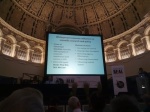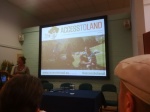
The 7th annual Oxford Real Farming Conference last week at Oxford Town Hall lived up to its now-established reputation as THE farming conference in Oxford, and a more progressive meetings of minds than the ‘one up the road,’ as the Oxford Farming Conference was usually referred to, which concentrated on the idea of Busines As Usual. Rousing opening plenary speeches on the benefits of sustainable agriculture and necessity for us all coming together to share ideas and motivation were delivered by Ruth West and Colin Tudge – who also asked us to think about what work is actually for. Lawrence Woodward then pointed out that the responsibility for a good food and farming system doesn’t just lie with the farmers – it lies with us all as consumers: “Without sustainable citizenship, we won’t have sustainable farming”. I also couldn’t help reflecting on the idea that the old notion of Saving The Planet needed updating – the planet will survive global warming and resource depletions despite us; it’s us, humanity, that won’t (along with probably many other species) – so if we want to survive, especially with anything like a semblance of our current lifestyle, we need to change what we’re doing and/or how we do it now. So we need to appeal to our innate selfishness and survival instinct to convince people.

The Wednesday Sessions: Soil, Jobs, Revolution & Money
Wednesday offered a multitude of tempting sessions, and it was difficult to try and choose just one when six were on the go at once. To start with I plumped for Soil Health Without Breaking the Bank, marvelling at the results of Farmer Jake’s long fodder radish roots from his minimum-tillage system, and how just two or three years of adding composts and manure can have dramatic affect on soil healthy and yields. I decided that the session was preaching to the already converted in my case (and seemed to be aimed at arable farmers) so snuck out and went along to the rest of the Better Jobs for Better Farming session back in the main hall, which included talks from the Soil Association’s Rachel Harries about the Future Growers’ scheme, and Bridget Henderson from Unite. Sustain have thrown down the challenge for a million more jobs in farming, which would be amazing (aiming for a rise from 1-2% people in the UK working in agriculture to more like 10%). The question posed was also what kind of jobs these should be – ie do we have to choose between more lower-paid low-skilled jobs and fewer highly skilled, highly paid jobs in agriculture?
DEFRA figures suggests that pigs and poultry on average are the only types of farms that get most of their income directly from the food they produce; the rest gain most of their income from subsidies and farm diversification (mind you, I’ve never been sent or answered a DEFRA questionnaire: in my case, all income for Grown Green comes from the veg I sell – but since DEFRA now thinks that anything under 5ha is not an ‘active farm’ and can’t possibly earn money, I doubt they would care. I’d like to invite any DEFRA minister to come and work on my 1ha and then decide whether the work is inactive or not). Marcus Potter from LANTRA suggested that we need to professionalise farming if we are to get more and better jobs, and we need to work on our framework of skills in order to get towards our million jobs target. Colin Tudge also explained that in a supermarket, a farmer will typically get only 20% of the supermarket price, and around 50% of that will go towards paying workers.

After a break and then brush-up on cover crops in the next session, it was time for lunch – and the launch of the LWA’s Rural Manifesto. The 46 action points were met with general approval by everyone in the room (especially the idea of a £120,000 cap on CAP subsidies, with the remaining money filtering down to smaller farms), and the manifesto was presented to Kerry McCarthy, and Shadow Secretary for Environment, Food and Rural Affairs, which seemed to go down well – she said in her speech that time in opposition was a chance to be radical and work on such policies. So Ed Hamer pinned her down (not literally) as she left to head back to Parliament, and reiterated that the LWA look forward to working with her on this.

 I then made it to the session on the Corruption of Agricultural Science, worrying slightly that it might be an anti-science rant; but fortunately all the speakers (most of them scientists themselves) sensibly pointed out how the majority sources of research funding now (ie big corporations) can skew the research made and also published results, and debated what “being scientific” really means. Jonathan Latham suggested that now is the time of democratisation of science, and Michel Pimbert highlighted the trend of patents and proprietary technologies in many lab’s approach to agricultural science.
I then made it to the session on the Corruption of Agricultural Science, worrying slightly that it might be an anti-science rant; but fortunately all the speakers (most of them scientists themselves) sensibly pointed out how the majority sources of research funding now (ie big corporations) can skew the research made and also published results, and debated what “being scientific” really means. Jonathan Latham suggested that now is the time of democratisation of science, and Michel Pimbert highlighted the trend of patents and proprietary technologies in many lab’s approach to agricultural science.

For the last session of a packed day I picked Funding Real Farming in the Council Chamber – although the focus of some of the talks was on community projects (and I really hope any such public funding is used to achieve the project’s aims other than food production, eg care farming, rather than to subsidise produce and undercut us independent businesses trying to make a living). However the talk and tips on crowdfunding was great and widely applicable: Michael Norton of the Centre for Innovation in Voluntary Action wisely advising us to be realistic, set aside plenty of time to dedicate to the fund-raising project, and to actually ask people you know for money (rather hard for Brits)! Likewise Dave Boyle from the Community Shares Company recommended using the fetishising-ness of ownership to your advantage, to get people to want to own a part of your business or project; especially as the tax relief available to community energy shares will be coming to an end soon, and there is an estimated £1.2 trillion of savings in ISAs earning very little interest currently.
Thursday 7th: Big Estates & Access to Land
The next day had a little more breathing-space and longer breaks in between sessions, which was invaluable for networking and general catch-ups; there was never a dull moment since there were a plethora of stands and a Blackwells book table to browse too, although I spent of my time meeting people around the LWA, Groundspring and OGA stands in the Old Library. In the morning I went along to Strengthening the People’s Markets back in the Council Chamber: slightly out of my usual area, but part of the attraction of the ORFC is turning up to a random session and not knowing what to expect, and learning new things. Andrea Ferrante from NAIB looked at how informal markets are not taken into account when policy-making, depsite accounting for 90% of food transactions; and Georgina McAllister showed the heartening demand for organic produce in Zimbabwe through her project Garden Africa.
The next session in the Council Chamber was possibly the key and highlight of the conference for me: The Big Estates of the Future, with Dame Helen Ghosh, Director-General of the National Trust; Alastair Martin, Secretary of the Duchy of Cornwall; Helen Woolley, Director General of the Country Land and Business Association; and John Varley, Director of Clinton Devon Estates. It was so great to have these speakers addressing the ORFC, since they are perhaps more the type of delegates you’d expect to see at the ‘other place’ up the road, as members of the establishment; yet they were happy to explain why they felt that big estates can address typical industry problems such sustainability, land access, jobs, environment and soil health. It occurred to me that big estates managed well can of course do as good a job as estates managed well and owned by the public; and that land managers and owners will of course want to manage their land well. However the priorities and way of addressing these problems may differ to those of the general population, or even people who work and live on the land – and unlike public land, if we don’t like the way some land is being managed, we can’t simply vote out the owners. Perhaps market forces can act in a similar way to democracy (or that is what many right-wing people will argue); and in the absense of any radical land reform in the short-term, it’s imperative that big estates hear and are involved in debtes such as these issues at the ORFC – particularly land access and opportunities for new entrants, which was my question to the panel.
All the speakers mentioned supporting new entrants, but I was keen to hear some real examples of how this support manifested. (We were allowed to put questions to the panel after some unrest following the chair’s own discussion with the speakers, which some felt rather monopolised the time available.) The fundamental issue here is political systems after all: do we trust the general population to vote in the ‘right’ people, and to have the ‘correct’ priorities? Or should we have benign dictators who agree with our own principles? Many years ago I decided that a free democracy was imperfect, but probably the best political system we have, as at least there is the opportunity to convince other free people of your way of thinking. The National Trust in an interesting case however, as it’s land held for the people, so a type of public land; but managed as private estates – and we can’t vote out those who make decisions there, or have much direct influence. Maybe we should start individually lobbying local National Trust property managers with idea for land access, as if they were our local Land MP.

This session put me in the mood to follow up on access to land issues, so I went along to the launch of the Land For Our Food film at the Access to Land session in the Long Room. Julio, Gavin and Rachel had come out to film me in the summer, and it was great to see the (almost) finished film launch (finished version due in a couple of week so watch this space for public launch news). The film sparked off an animated discussion about access to land, and it was great to see conference celebrity George Monbiot (also interviewed in the film) come up and join us on the panel for questions. When asked if land reform was due and we were ready for it, I suggested that the plethora of CSA projects and interest from new entrants wanting to get back to land suggested that it was due and needed; but wasn’t sure what form it would take, or when it would happen. George pointed out that the land reform happenening in Scotland should be watched closely by England and Wales, and as the only European country not have had it (when the French Revolution happened and French peasants took back the land, the UK put through the Enclosure Act instead), something needs to happen. I can’t help thinking though that as long as we have bread and circuses (ie Nando’s and The X Factor), land reform and access issues won’t be prioritised by policy makers since the bulk of the population is appeased, distracted and ignorant…
I kept to the political theme at the next session on The Role of Local Authorities in Securing Access to Land, which was weirdly a very uplifting and positive session: Bonnie Hewson whizzed us through her excellent work at Bristol Food Producers, which seeks to help the council match-make new entrants to farming and growing to suitable council land. This is an excellent template that can be used for other councils, and help keep their obligations to have county farms, while also earning councils some much-needed income. It was great to see and hear councils such as Oxford also showing interest, and hear from Charles Coats (previously of Gloucestershire County Council and Cardiff City Council, now independent consultant on council farms) that according to Part III of the 1970 Agriculture Act Sec 39, councils “shall make it their general aim to provide opportunities for persons to be farmers on their own account by letting holdings to them”; and that councils do want to encourage people to farm council land, but aren’t always able to divert resources into making this happen successfully. Many people on councils are aware for the need for review and tightening of this 46-year-old legislation, and it needs policy desire at a higher level to make this so, and make land access a priority.
Above all the ORFC conference is a heartening experience: sometimes on our own we can get depressed when reform, progress, attention and encouragement in food and farming doesn’t seem to happen, and politicians and the media pay little attention to is, unless it’s to blame it for some hotter political potato such as flooding, obesity or migrant workers. However, meeting up with and seeing the 800+ delegates here reminds you that you don’t have to take on all these issues yourself, and that you’re not alone: many other people are doing excellent work on such matters, getting good and persuasive results, and finding the right people on a policy level to tell. So the message is: keep on doing what you’re doing, fight the good fight, and don’t lose heart.

